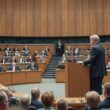A proposal by German Interior Minister Alexander Dobrindt, advocating for the integration of topics related to war and disaster preparedness into the school curriculum, has ignited a contentious debate within the national education ministers’ conference, revealing deep divisions amongst policymakers.
The suggestion, intended to better equip younger generations for dealing with crises, has drawn both support and forceful criticism, highlighting anxieties surrounding the current geopolitical landscape and the role of education in navigating it. Hessen’s Education Minister Armin Schwarz, a fellow CDU member, voiced his endorsement, citing positive feedback from students and arguing that the initiative forms part of a broader societal need to prepare for turbulent times. He emphasized the potential for students to disseminate this knowledge within their families, creating a ripple effect of preparedness. Baden-Württemberg’s Green Party Education Minister, Theresa Schopper, echoed this sentiment, stating that early awareness of potential dangers is crucial for enabling young people to act responsibly in crisis situations, acknowledging the vital contribution schools can make.
However, the proposal has faced significant pushback. Sven Teuber, the education minister for Rhineland-Palatinate (SPD), expressed deep reservations, contending that it risks needlessly instilling fear and anxiety within children and their parents. Teuber underscored the schools’ fundamental role as safe and secure learning environments, arguing that such initiatives could be counterproductive.
Further complicating the situation, Simone Oldenburg, president of the education ministers’ conference and Mecklenburg-Vorpommern’s education minister (Left Party), initially condemned Dobrindt’s pronouncements as indicative of a misunderstanding of the core functions of the education system and the complexities of teaching. While a unified stance against Dobrindt’s proposal was initially reported, this consensus appears fractured. Schleswig-Holstein’s CDU education minister, Dorit Stenke, publicly supported the “direction” of Dobrindt’s plan. She asserted that widespread anxieties stemming from multiple crises and an evolving security environment are actively impacting students, creating a demand for answers that the school system is positioned to address.
The debate exposes a deeper ideological chasm within German politics; one concerning how best to prepare young citizens for an increasingly volatile world – through direct awareness and preparedness, or by maintaining a core focus on fostering security and stability within the educational sphere. The disagreement also raises questions about the appropriate level of governmental intrusion into school curricula and the potential for politicizing educational content.





